Planning to move from a visit visa to work visa in Qatar can feel confusing if you are new to the system. The country has strict rules, and not knowing them may lead to delays or even penalties. Many professionals who enter on a short-term visa later receive job offers, but the process to switch status is not as simple as it sounds. In this guide, we break down the legal steps, practical tips, and common mistakes, so you understand the right way to secure long-term employment in Qatar.
Planning to move from a visit visa to a work visa in Qatar can feel confusing if you are new to the system. The country has strict rules, and not knowing them may lead to delays or even penalties. Many professionals who enter on a short-term visa later receive job offers, but the process to switch status is not as simple as it sounds.
One of my friends from Pakistan, Ali traveled to Doha on a 30-day visit visa to explore job opportunities. Within two weeks, he received an offer from a construction company. Instead of trying shortcuts, his employer guided him through the legal process, exiting the country first, then applying for a work visa under sponsorship. This real case shows why following proper steps is essential for a smooth transition to long-term employment in Qatar.
Can You Convert a Visit Visa to a Work Visa in Qatar? (Quick Answer)
Many people think they can directly change a visit visa into a work visa while staying in Qatar. The truth is, Qatar’s immigration law does not allow this direct switch. A visit visa is meant for short-term stays like tourism, business meetings, or family visits. A work visa, on the other hand, is tied to an employer who takes legal responsibility as your sponsor.
If you get a job offer while on a visit visa, you must leave the country first. After that, your employer can apply for a work visa on your behalf. Once approved, you re-enter Qatar with the proper work visa and then apply for your residency permit. This step ensures that the process stays legal, transparent, and safe for both the worker and the employer.
Understanding Qatar’s Visa Categories
Qatar has different visa types, each designed for a specific purpose. Knowing the difference between a visit visa and a work visa helps you understand why they cannot be converted directly.
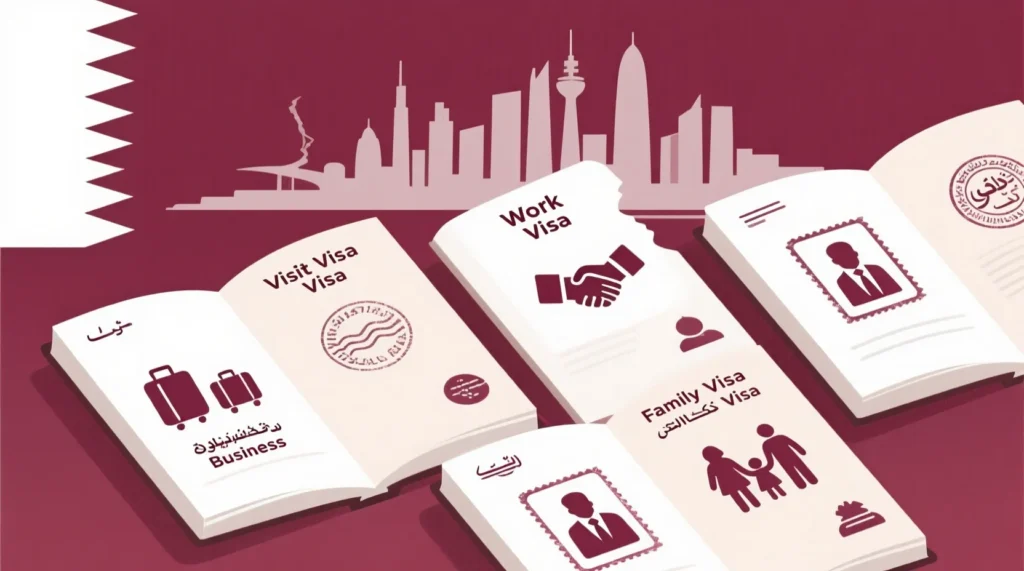
What Is a Visit Visa?
A visit visa is for short stays. It is often used for tourism, family visits, or attending meetings and events. Depending on the type, it may be valid for 30 to 90 days, with some options extendable. A visit visa does not give legal permission to work or earn money in Qatar. Working on this visa can result in fines, deportation, or even a ban from re-entry.
What Is a Work Visa?
A work visa, also called an employment visa, is linked to a specific job and employer. It is the legal entry point for foreigners who want to work in Qatar. Once approved, it allows you to enter the country, complete medical tests, and get a Residency Permit (RP). The RP gives you long-term stay rights, access to healthcare, and the ability to sponsor your family. Unlike a visit visa, a work visa is always tied to an employer who acts as your sponsor.
Visit Visa vs Work Visa in Qatar
| Feature | Visit Visa | Work Visa (Employment Visa) |
|---|---|---|
| Purpose | Tourism, family visits, short business trips | Long-term employment under a Qatari employer |
| Validity | 30–90 days (some extendable) | 1–3 years (renewable, depending on contract) |
| Work Permission | Not allowed | Allowed, linked to employer |
| Sponsorship | Not tied to an employer (self or family sponsor possible) | Always tied to a Qatari employer who acts as your sponsor |
| Residency Rights | No residency rights | Leads to Residency Permit (RP) after medical tests and approval |
| Family Sponsorship | Not possible | Possible once Residency Permit is granted |
| Penalties if Misused | Fines, deportation, travel ban | Employer responsible; violations can lead to job loss, fines, or cancellation |
Why Qatar Doesn’t Allow Direct Visa Conversion
Many people are surprised when they learn that Qatar does not allow the direct conversion of a visit visa into a work visa. At first, it may feel like an unnecessary step, but the policy is built on legal, social, and economic reasons. Understanding these reasons helps visitors avoid mistakes and prepares them for the correct process.
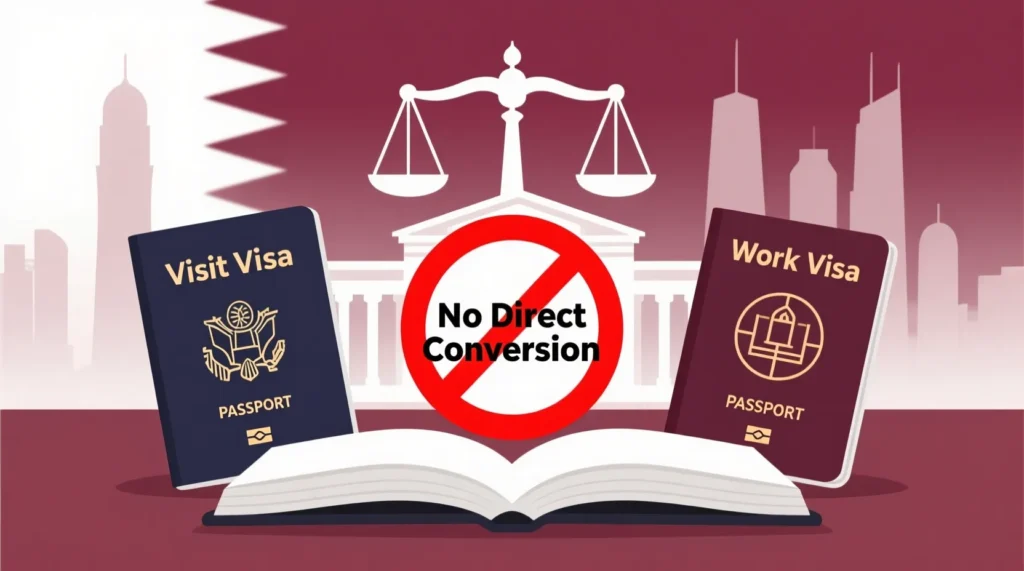
Clear Legal Boundaries
Qatar’s immigration framework is designed to maintain order. Each visa type has a unique function. A visit visa is issued for short-term stays, tourism, or family visits, while a work visa is strictly tied to long-term employment under a Qatari sponsor. If these categories were blurred, it would open the door for misuse. For example, someone might enter the country as a tourist and quietly start working without registering with the Ministry of Labor. This creates a “gray area” that the government wants to avoid.
Employment Transparency
Requiring workers to leave Qatar before re-entering on a work visa ensures that every employment offer passes through official approval systems. The Ministry of Interior (MOI) and Ministry of Labor verify that the company is legally registered, that the contract follows labor laws, and that the worker’s position is genuine. This transparency reduces the chances of fake job offers, illegal recruitment, or companies exploiting foreign workers.
Avoiding Visa Misuse
Without this strict rule, Qatar could face an influx of workers entering under tourist visas and shifting to unregulated jobs. This not only harms the local labor market but also puts workers at risk. For instance, someone who accepts an informal job on a tourist visa has no medical insurance, no residency rights, and no legal protection. By separating visit visas from work visas, Qatar reduces the chances of such exploitation.
Protecting Workers’ Rights
Qatar has faced international attention for its labor reforms, especially in the last decade. The government now emphasizes safer working conditions, fair recruitment, and employee rights. By requiring a proper work visa and residency permit, Qatar ensures that workers receive health checks, contracts, and sponsorship before starting employment. This step protects the worker from falling into unsafe or illegal arrangements.
Proper Steps If You Receive a Job Offer on a Visit Visa
It is common for visitors to Qatar to get a job offer during their short stay. But since a visit visa cannot be directly converted into a work visa, you must follow the legal pathway. Here is the correct process explained step by step:
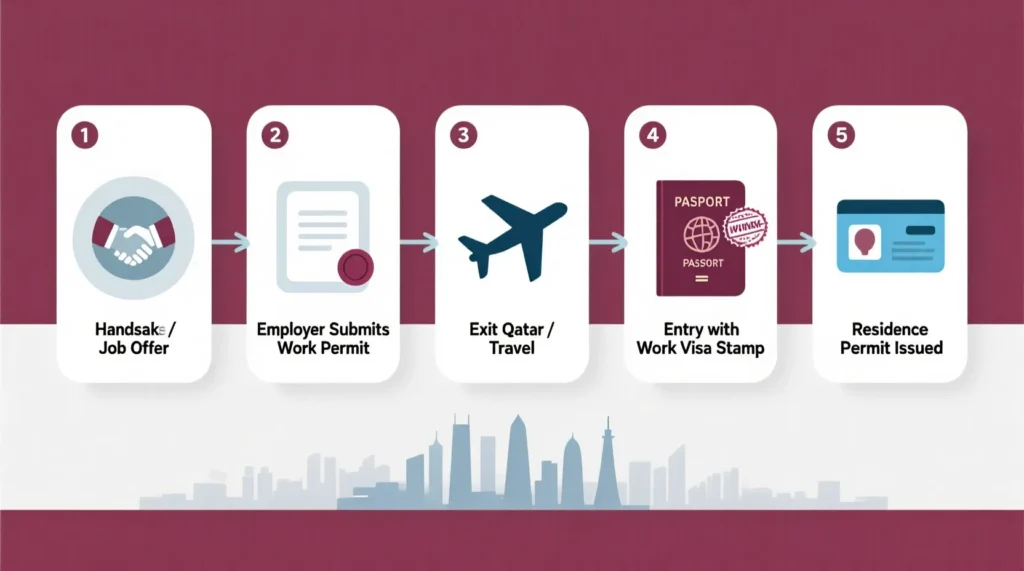
Step 1 – Exit Qatar
Once you receive an official job offer, the first step is to leave Qatar before your visit visa expires. This may feel inconvenient, but it is necessary. Employers cannot legally apply for a work visa if you are still inside the country on a visit visa.
Step 2 – Employer Applies for Work Visa
After you exit, your employer takes responsibility for the application. They must submit your job contract, copies of your passport, and supporting documents to the Ministry of Labor and Ministry of Interior. The process usually includes:
- Approval of the employment contract
- Sponsorship registration by the company
- Payment of visa fees by the employer
At this stage, you may also be asked to send documents from abroad, such as attested degrees, medical clearance from your home country, or a police clearance certificate, depending on the job type.
Step 3 – Re-enter Qatar with Approved Work Visa
Once the work visa is approved, you can re-enter Qatar legally as an employee under sponsorship. On arrival, you will undergo mandatory medical tests, fingerprinting, and biometric registration. After passing these checks, your employer applies for a Residency Permit (RP) on your behalf. The RP allows you to live and work in Qatar long-term and even sponsor your family.
How to Apply for a Work Visa in Qatar (Legal Process)
Applying for a Qatar work visa involves several legal procedures that both the employee and employer must complete. Here’s a detailed breakdown of every stage:
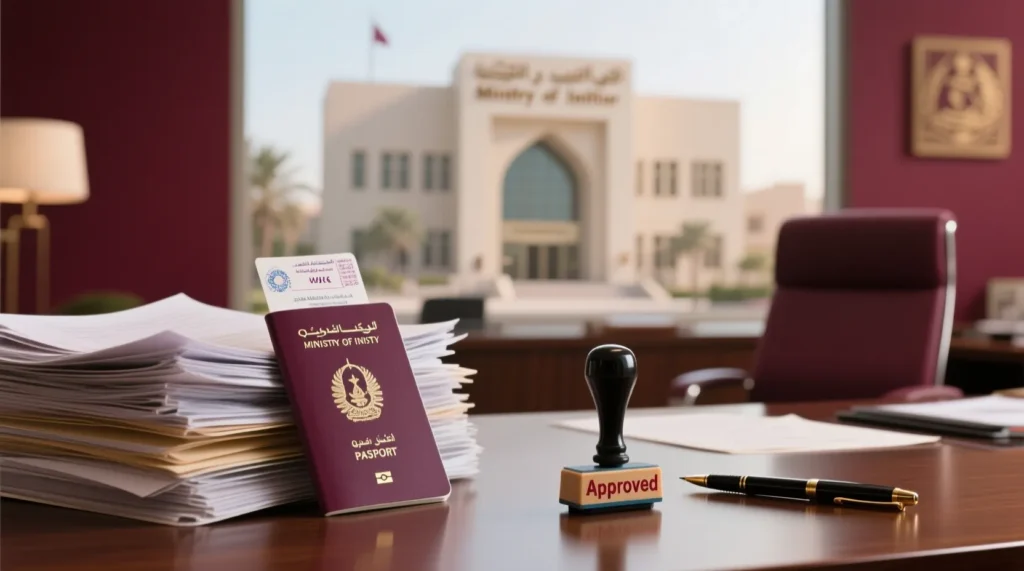
1. Secure a Job Offer
The first and most important step is to get hired by a Qatari company. Foreign nationals cannot apply for a work visa independently—your employer must sponsor you. A valid job offer letter should include:
- Position and job title.
- Salary and benefits package.
- Duration of the contract.
- Company details with official stamp.
Without this official offer, the visa process cannot begin.
2. Employer Sponsorship Application
Once you accept the job, your employer becomes your legal sponsor. They will apply for your work visa through Qatar’s Ministry of Labour. At this stage, the employer must provide:
- A copy of your passport (valid for at least 6 months).
- Employment contract approved by the ministry.
- Company registration documents and sponsorship quota approval.
Important: The visa quota means every company can only sponsor a certain number of foreign employees, based on its size and industry.
3. Medical Tests and Biometric Verification
Before your work visa is fully approved, you need to undergo mandatory health checks to prove you are medically fit to work in Qatar. These usually include:
- Blood tests for infectious diseases (HIV, hepatitis, tuberculosis).
- Chest X-ray.
Alongside medical tests, you’ll also provide fingerprints and biometric data for Qatar’s immigration system. This ensures worker identity verification and helps prevent fraud.
4. Security Clearance
Qatar’s government requires every foreign worker to pass a background check. Authorities will verify:
- Criminal record from your home country.
- Past employment history.
- Immigration violations (if any).
If you have a clean history, the process moves forward smoothly.
5. Approval and Issuance of Work Visa
Once medical and security checks are cleared, the Ministry of Interior issues your work visa. This document allows you to legally enter Qatar as an employee. The work visa is usually valid for 1 to 3 months initially, during which you must complete the residency process.
6. Apply for Qatar Residency Permit (RP)
After arriving in Qatar on a work visa, the final step is converting it into a Residency Permit (RP). This is handled by your employer and is essential because:
- It allows you to live and work legally in Qatar.
- You can sponsor family members (spouse, children, parents).
- It provides access to healthcare, banking, and housing services.
The RP card typically shows your photograph, profession, and sponsor details.
Summary:
The Qatar work visa process may sound complicated, but most steps are handled by the employer. Your main responsibilities are to provide correct documents, clear medical/security checks, and ensure your passport is valid.
Important Considerations During the Process
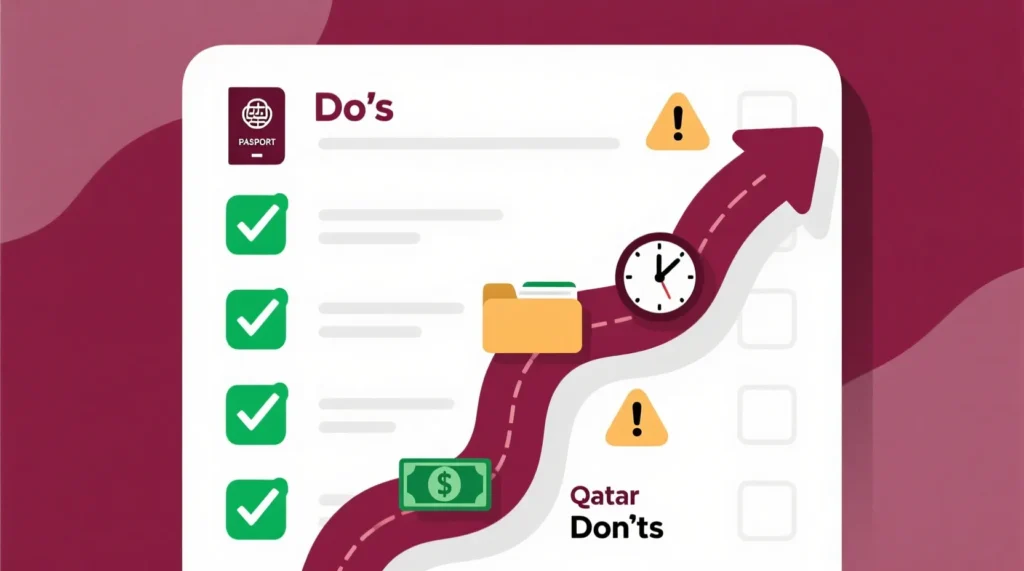
Validity of Visit Visa
Your visit visa is the foundation of your legal stay in Qatar while you wait for your job offer or work visa process to begin. Always double-check the expiry date of your visa. Some visit visas are valid for 30 days, while others can be extended up to 90 or even 180 days, depending on the type. If your visit visa expires while you are still waiting for your work visa, you risk fines, overstays, or even deportation. A smart move is to keep at least two weeks of buffer time before expiry to either extend it or leave and re-enter Qatar if required.
Legal Compliance
Qatar has strict labor and immigration laws. Working on a visit visa is illegal and can result in heavy fines for both you and your employer, as well as a potential ban on re-entry. Until your work visa is officially approved, you should avoid any work-related tasks, including part-time or trial jobs. Make sure your employer follows the proper process instead of asking you to “start working right away” on a visit visa.
Avoiding Overstays & Penalties
Overstaying even a single day after your visit visa expires can lead to daily fines (around QAR 200 per day) and legal complications. These fines accumulate quickly and may prevent you from converting your visa into a work visa until they are cleared. In some cases, overstaying can also delay your future residency permit application. To avoid this, always track your visa status on the Ministry of Interior (MOI) portal or Metrash app.
Seeking Professional Guidance (if needed)
If you are unsure about the steps, it is wise to consult either a legal advisor or a certified PRO (Public Relations Officer) in Qatar. Many companies also hire agencies to handle work visa processing smoothly. Professional guidance ensures that you don’t miss any documents, fall for fake job offers, or make costly mistakes. It also helps if your employer is new to the process and you want assurance that everything is being done according to Qatari law.
Common Mistakes Applicants Make
When applying for a Qatar work visa after receiving a job offer on a visit visa, many applicants unintentionally make mistakes that can delay or even jeopardize the approval process. Being aware of these common errors will help you avoid unnecessary stress, wasted money, and legal trouble.
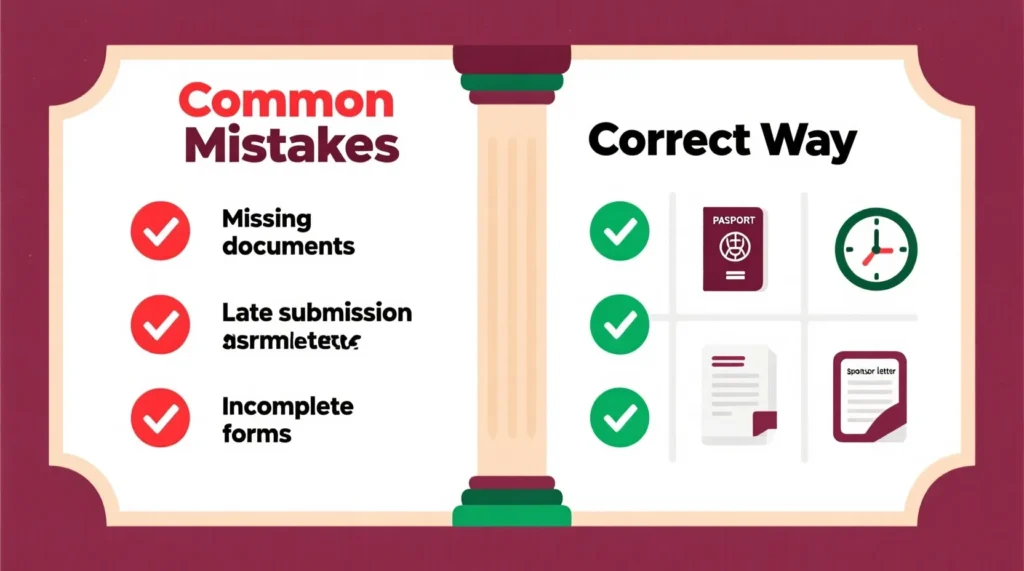
1. Overstaying the Visit Visa
One of the biggest mistakes people make is staying beyond the validity of their visit visa while waiting for their work visa process to begin. Overstaying can result in hefty fines (QR 200 per day) and can even lead to a travel ban, which may prevent you from returning to Qatar for a specific period. Always ensure your exit from the country before your visit visa expires.
2. Not Exiting Qatar Before Work Visa Approval
Qatar law requires applicants to exit the country once they receive a job offer and then re-enter with a valid work visa. Some applicants wrongly assume they can convert a visit visa directly into a work visa without leaving Qatar, but this is usually not permitted. Skipping this step can delay the process or cause rejection.
3. Submitting Incomplete or Incorrect Documents
Documentation is critical in Qatar’s visa process. Errors such as missing passport copies, incomplete medical reports, or outdated documents can lead to rejection or long delays. Even small inconsistencies between your documents (for example, mismatched spellings of your name) may raise red flags during verification.
4. Depending on Unregistered Agents
Many applicants fall into the trap of paying unregistered or fake agents who promise quick visa approvals. These agents often charge high fees and provide no guarantee. In Qatar, the work visa process is the legal responsibility of your employer (sponsor), not external agents. Always deal directly with your employer or their official representatives.
5. Ignoring Medical and Security Requirements
Failing medical tests (e.g., TB, HIV, or Hepatitis) or security clearance can result in visa rejection. Some applicants neglect these requirements and are caught off guard. It’s essential to undergo all required medical screenings and ensure your background records are clean before applying.
6. Misunderstanding Employer’s Role
Another mistake is assuming that the employee can apply for the work visa directly. In Qatar, the employer (sponsor) must apply on your behalf. If you try to apply independently or pressure your employer to cut corners, it may harm your chances of approval.
7. Not Tracking Application Status
Some applicants don’t follow up on the status of their visa application with their employer or the Ministry of Labour. Since delays can occur, regular communication ensures that you know if additional documents or actions are needed.
Expert Tips for a Smooth Work Visa Process
Transitioning from a visit visa to a work visa in Qatar can feel overwhelming, especially if it’s your first time dealing with legal paperwork, medical tests, and sponsorship requirements. Following expert advice can help you avoid unnecessary delays, financial penalties, or even rejection. Below are practical tips to ensure your process goes as smoothly as possible:
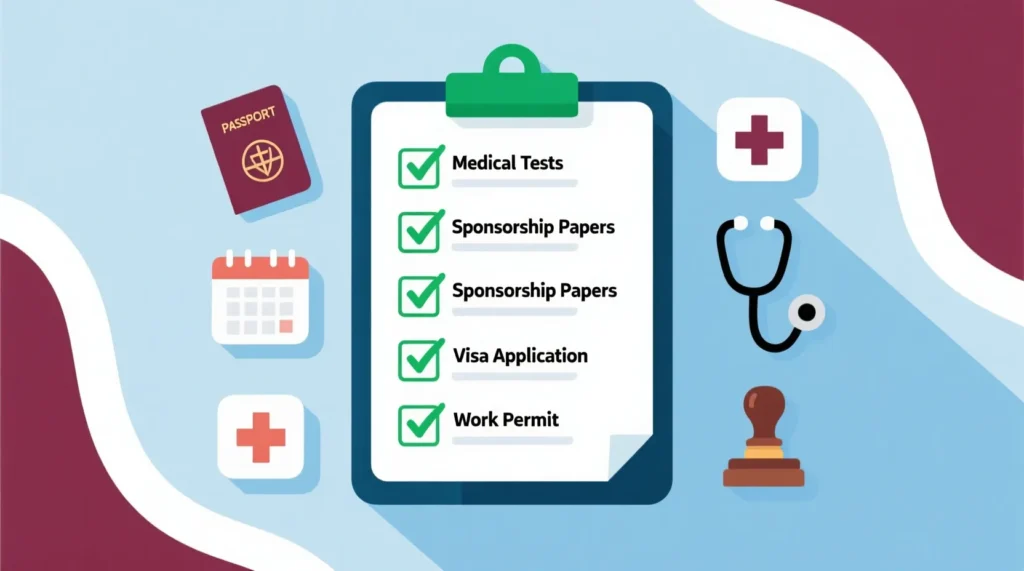
1. Maintain Clear Communication with Your Employer
- Make sure your employer is fully aware that you are currently on a visit visa.
- Ask for a timeline of the sponsorship application and insist on written confirmation wherever possible.
- Clarify which costs will be covered by the employer (visa fees, medical tests, flight tickets) to avoid disputes later.
2. Keep Track of Visa Validity Dates
- Always monitor the expiration date of your visit visa to avoid overstaying.
- If the process is taking longer than expected, request your employer to apply for an extension before your current visa expires.
- Remember: overstaying even a single day may lead to fines or complications in the approval process.
3. Prepare Your Documents in Advance
- Ensure your passport has at least 6 months validity before applying.
- Keep multiple copies of essential documents such as your job offer letter, academic certificates, passport, and medical clearance.
- Get your educational certificates attested in your home country, as unverified documents often cause rejections.
4. Be Proactive with Medical and Security Checks
- Don’t delay medical tests once your employer initiates the process—appointments can sometimes take time.
- Stay updated on vaccination requirements, as health checks are strict in Qatar.
- Cooperate fully during biometric registration and security clearance; any missing step can stall the process.
5. Stay Updated on Qatar’s Immigration Policies
- Immigration laws may change, so regularly check the Ministry of Interior (MOI) Qatar website.
- Be cautious of outdated advice from forums or unverified sources; always rely on official updates.
6. Avoid Relying on Agents or Unlicensed Middlemen
- While some agents may claim to “speed up” the process, many operate illegally and can put you at risk of fraud.
- Always process your work visa through your employer or a government-approved PRO (Public Relations Officer).
7. Plan Your Exit and Re-entry Carefully
- If you must exit Qatar while the work visa is in process, confirm with your employer first.
- Make sure your entry visa is issued before booking flights back to Qatar.
8. Keep Financial Backup
- Since the transition process may take weeks, ensure you have enough funds to cover living expenses outside Qatar if needed.
- Avoid making large commitments (like renting a house) until your work visa and residency permit (RP) are officially approved.
Consequences of Violating Qatar’s Visa Rules
Qatar has strict visa and immigration laws. Violating these rules can result in heavy fines, deportation, or even long-term bans. Many newcomers make mistakes out of lack of awareness, but the authorities consider these violations serious offenses. Let’s break down the key consequences:
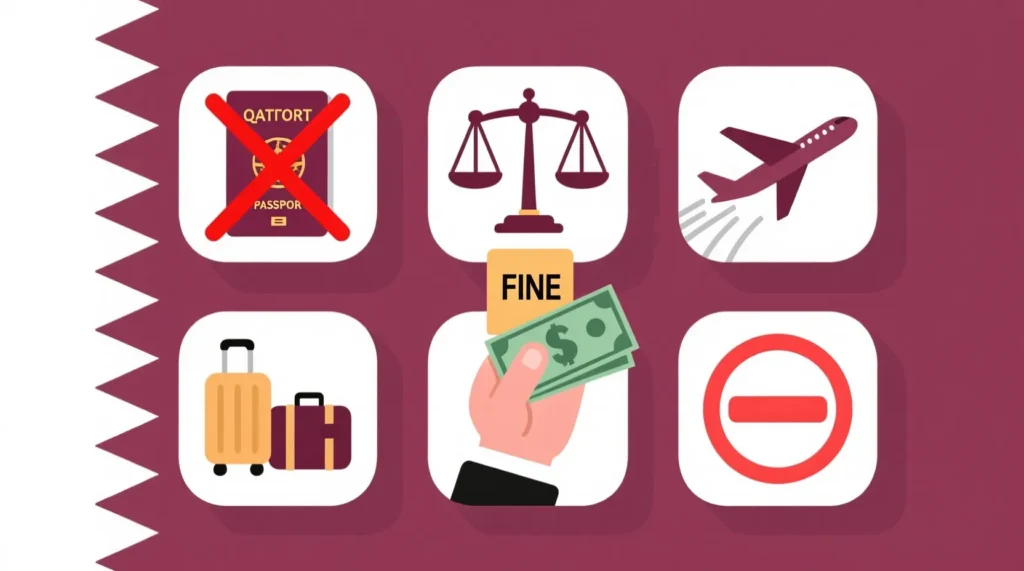
Working on a Visit/Tourist Visa
A visit or tourist visa is strictly meant for short-term stays, tourism, or business meetings. It does not permit employment. If an individual is caught working while holding such a visa:
- The employee may face immediate arrest, fines, and deportation.
- The employer hiring the worker can also face penalties, including business license suspension or heavy fines.
- The individual may be blacklisted, preventing them from returning to Qatar or applying for jobs in the future.
This makes it extremely risky to start working before converting your visa status legally.
Overstaying a Visit Visa
Visit visas in Qatar are valid for a specific period (commonly 30, 60, or 90 days). If someone stays beyond the allowed time without renewal or extension:
- A daily fine is imposed (often QR 200 per day, subject to current regulations).
- Authorities may refuse future visa applications until all dues are cleared.
- Continuous overstays can result in deportation and a ban from re-entering Qatar.
Therefore, it’s essential to track the visa’s expiry date and renew or exit Qatar before it lapses.
Blacklisting & Deportation
The harshest consequence for breaking Qatar’s visa laws is being blacklisted. Once blacklisted:
- You cannot enter Qatar again for years, sometimes permanently.
- Your name may be shared with GCC countries, limiting employment opportunities in the region.
- Deportation records can damage your chances of getting jobs in other Gulf countries as well.
Deportation also comes with personal and professional setbacks — financial loss, wasted opportunities, and reputational damage.
In short: Breaking visa rules in Qatar is never worth the risk. Always ensure you are legally compliant to protect your career and stay in the country safely.
Volunteering or Internships on a Visit Visa
Many newcomers to Qatar assume that engaging in volunteer work or unpaid internships while on a visit visa is harmless since there is no direct financial gain. However, this assumption can lead to serious consequences under Qatari immigration and labor laws.
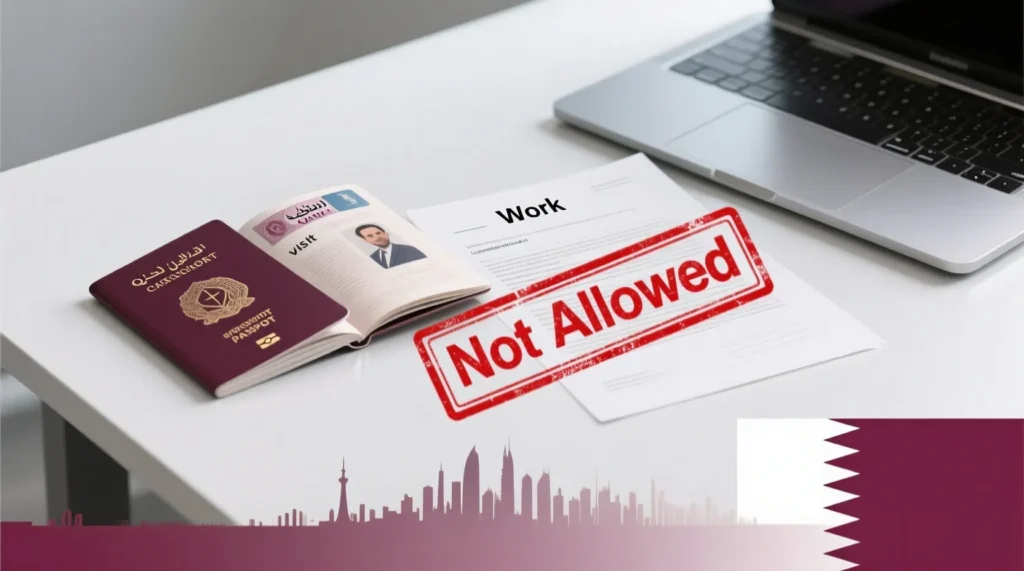
1. Legal Restrictions
Qatar’s visa system is very specific about the purpose of each visa type. A visit visa is strictly for tourism, short business trips, or visiting family. It does not allow any form of work whether paid or unpaid. Even internships, if conducted without the right visa or permit, are treated as unauthorized employment.
2. Why Even Unpaid Work is Restricted
From Qatar’s perspective, any form of work (including volunteering) impacts the labor market and must be regulated. Authorities want to ensure:
- Fair opportunities for legal residents and workers.
- Monitoring of workplace safety and compliance.
- Prevention of exploitation of interns or volunteers.
This is why organizations are not legally permitted to engage individuals on a visit visa for volunteering or internships.
3. Possible Consequences
If caught working or volunteering on a visit visa, applicants may face:
- Fines for violating visa conditions.
- Immediate deportation from Qatar.
- Blacklisting, which can ban future entry to Qatar or even the wider GCC region.
- Penalties for the employer/organization, including hefty fines and potential suspension of their ability to hire foreign staff.
4. Correct Path for Internships or Volunteering
Those who genuinely want to gain experience in Qatar should:
- Apply for the proper work visa or internship-specific permit through the sponsoring organization.
- Ensure the employer is registered and authorized to host interns or volunteers.
- Confirm all documentation (medical tests, sponsorship, residency permit) is completed before starting.
5. Professional Advice
Before accepting any internship or volunteer role in Qatar, it’s wise to:
- Seek legal or immigration advice.
- Confirm with the employer that they will handle sponsorship properly.
- Avoid “informal arrangements” that may put your future career and travel rights at risk.
Benefits of Following Legal Procedures
Applying for and working in Qatar through the legal process is not only a requirement but also a way to protect your rights and ensure long-term stability. Many applicants are tempted to take shortcuts—such as working on a tourist visa or overstaying a visit visa, but these practices can lead to serious risks, including deportation and blacklisting. By following the correct legal steps, you unlock several benefits that secure both your career and your life in Qatar.
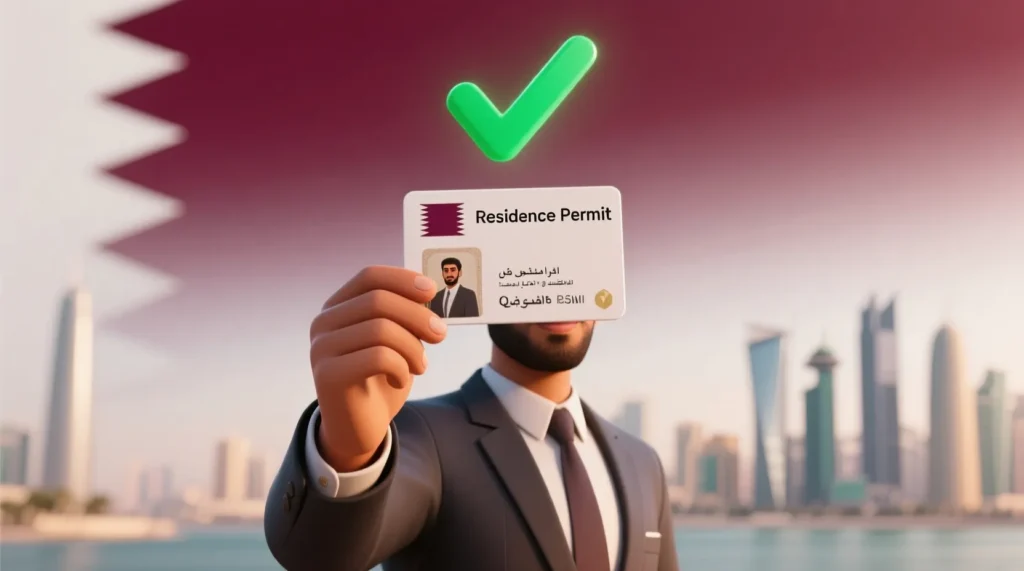
1. Job Security and Stability
When you are hired legally under a work visa, you have the backing of your employer and the Ministry of Labour. This ensures that you are protected against sudden termination without proper notice and that your contract terms are respected.
2. Access to Residency Permit (RP)
A legal work visa allows you to apply for a Residency Permit, which is essential for living comfortably in Qatar. The RP enables you to:
- Open a bank account.
- Rent an apartment.
- Apply for driving licenses.
- Access healthcare and government services.
Without it, your stay in Qatar will always remain uncertain.
3. Protection Under Qatari Labour Law
Legal employees are entitled to benefits under Qatari labour laws, such as:
- Fixed working hours and overtime pay.
- End-of-service gratuity.
- Medical coverage (depending on the employer).
- Paid leave and holidays.
This legal backing protects you from exploitation and ensures fair treatment.
4. Ability to Sponsor Family Members
Once you have a valid work visa and RP, you can sponsor your spouse and children to join you in Qatar. This is not possible if you are staying illegally or working on a tourist visa.
5. Freedom to Travel In and Out of Qatar
With a valid work visa and RP, you can easily exit and re-enter Qatar without legal hurdles. Overstayers or illegal workers often face bans, deportation, or travel restrictions.
6. Better Career Growth Opportunities
Employers in Qatar prefer to promote or invest in workers who are legally employed. Being compliant with visa rules builds trust and opens doors for promotions, salary raises, or even switching jobs legally under new sponsorship rules.
7. Peace of Mind
Perhaps the most overlooked benefit is peace of mind. When you follow the correct process, you don’t have to constantly worry about inspections, fines, or deportation. Instead, you can focus on your career, family, and personal growth.
Frequently Asked Questions (FAQs)
Can I convert my tourist visa to work visa in Qatar?
Yes, but not directly. You will need a Qatari employer to sponsor you and initiate the process of converting your tourist visa into a work visa. This usually requires exiting and re-entering Qatar or applying for a new visa under the employer’s sponsorship.
Can I get a job in Qatar with a tourist visa?
You can search and attend interviews while on a tourist visa, but you cannot legally work. Actual employment requires a valid work visa or residence permit sponsored by your employer.
How to convert visit visa to residence visa in Qatar?
To convert, your sponsor (employer or family member) must apply for a residence permit on your behalf. This process includes medical tests, fingerprinting, and submission of official documents to the Ministry of Interior.
Is it possible to convert visit visa to work visa?
Yes, it is possible with employer sponsorship. The employer must submit a request to the Ministry of Labour and Interior to change your visa status. However, approval is not guaranteed and depends on compliance with regulations.
How much is a 2 year work visa in Qatar?
The cost varies depending on your employer, industry, and nationality. On average, it can range between QAR 2,000 – QAR 5,000 (USD 550 – USD 1,370), usually covered by the employer.
How can I convert a visitor visa to a work permit?
You cannot directly convert it yourself. Your employer must apply for your work permit and residency. Once approved, your visa status will change legally under their sponsorship.
Can I change my visa without NOC in Qatar?
In most cases, you need a No Objection Certificate (NOC) to switch employers. However, new reforms allow some employees to change jobs without NOC under certain conditions, especially if the contract is completed.
How long does it take to get a work visa in Qatar?
The processing time is typically 2–4 weeks, but it may take longer depending on document verification, medical tests, and the efficiency of your employer’s submissions.
How to extend a tourist visa in Qatar?
You can extend it online through the Ministry of Interior (MOI) portal or by visiting an immigration office. Most tourist visas can be extended for up to 30 days, and in some cases, longer depending on your nationality.
Final Words
Converting a visit visa to a work visa in Qatar may seem complex, but with the right guidance and by following legal procedures, the process becomes much smoother. Always remember that working on a tourist or visit visa is illegal and can lead to penalties, fines, or even deportation. Instead, focus on staying compliant with Qatar’s immigration laws by securing the proper work or residence permit before starting employment.
Whether you’re planning to build a long-term career or simply seeking better opportunities in Qatar, ensure that every step is legally documented and approved by the Ministry of Interior and your sponsoring company. By doing so, you protect not only your future in Qatar but also your professional reputation.
If you’re unsure about the process, consult with your employer, a legal advisor, or authorized agents to avoid mistakes. Staying informed and proactive is the best way to successfully transition from a visit visa to a work visa in Qatar.

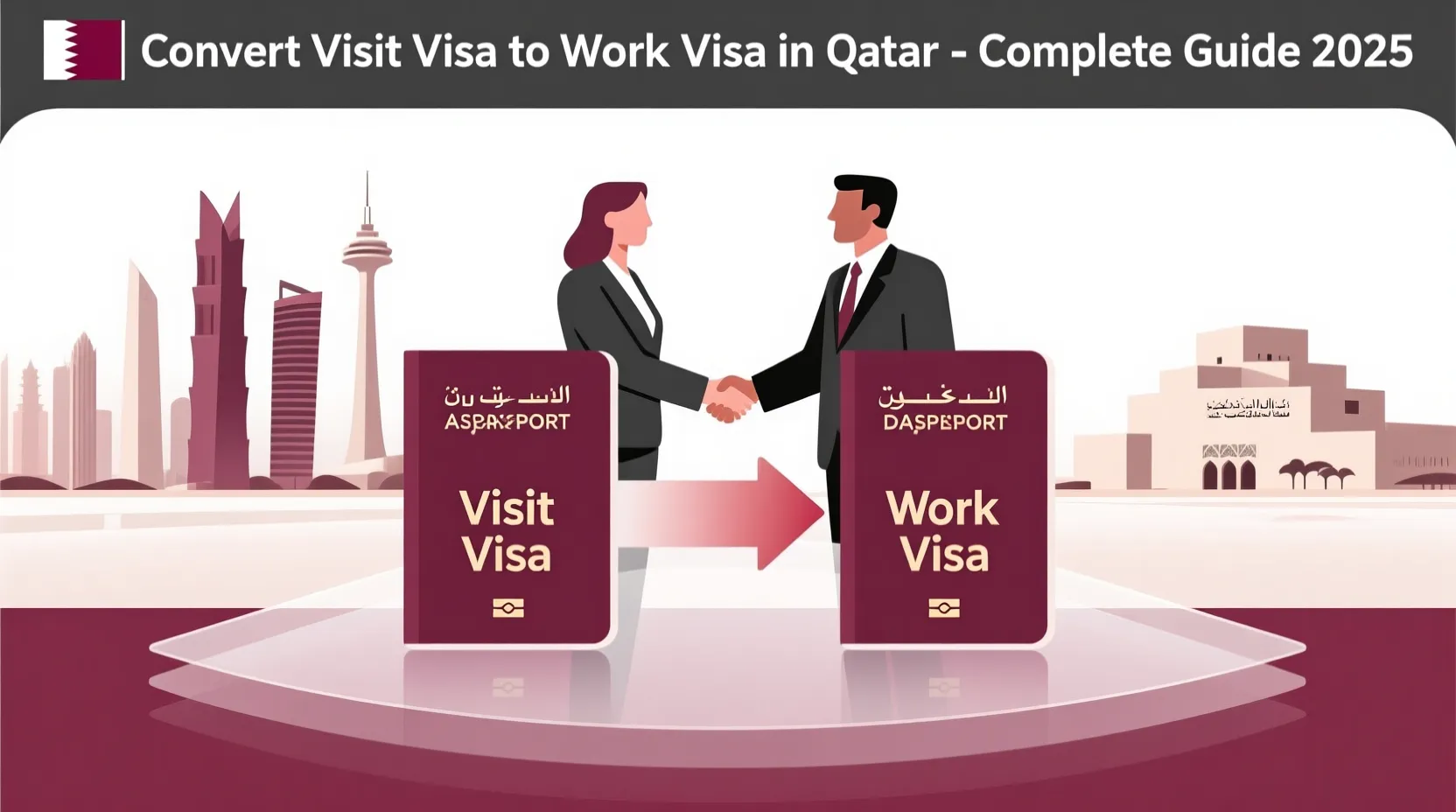

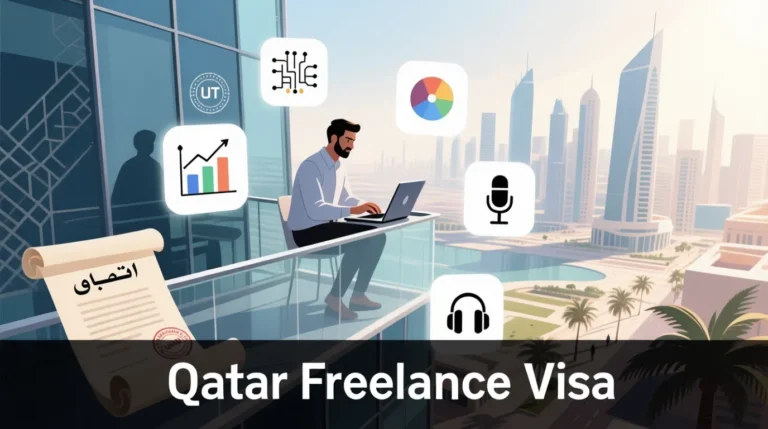
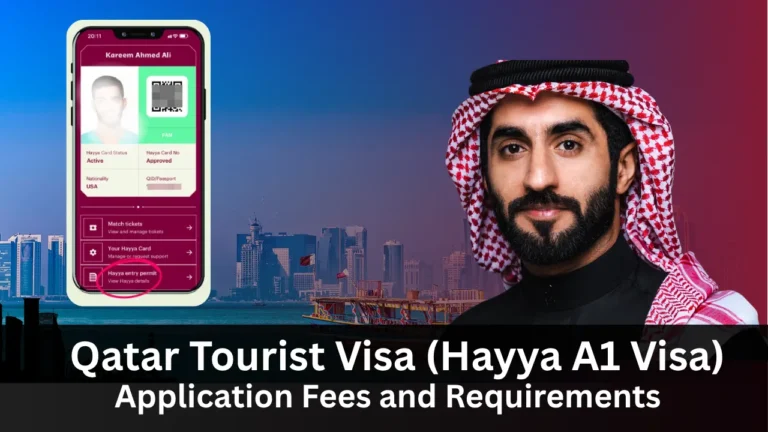



It’s remarkable in support of me to have a web page, which is helpful in favor of my
knowledge. thanks admin